Parlor Guitars – Unleashing the Charm of Compact Brilliance
Parlor guitars have carved a special place in the hearts of guitar enthusiasts, offering a delightful blend of compact size, vintage charm, and exceptional tonal character. As an avid guitarist myself, I want to provide helpful suggestions for those seeking a delightful musical companion. In this article, we will explore the origins, advantages, factors to consider when choosing a parlor guitar, popular brands, music styles suited for these guitars, maintenance tips, essential accessories, and more. So, let’s dive into the captivating world of parlor guitars.
What is a Parlor Guitar?
Parlor guitars have a rich history dating back to the 19th century. These guitars are characterized by their smaller size and distinctive body shape, making them perfect for intimate settings and solo performances. Traditionally, parlor guitars were designed for home use and social gatherings, bringing people together through the joy of music. Today, they continue to captivate musicians with their unique allure and versatile sound.
Popular Brands of Parlor Guitars
Several renowned brands have embraced the beauty and charm of parlor guitars, offering a range of models to choose from. Here are some notable brands worth exploring and an example or two of what they have to offer in a Parlor Guitar.
Martin
Martin is a legendary brand known for its acoustic guitars, and they have a long history of producing exceptional parlor guitars. Their instruments combine meticulous craftsmanship with rich, resonant tones, making them a popular choice among musicians. Although Martin does not classify a guitar as “Parlor”, here are a couple of examples of their line that fit the description.
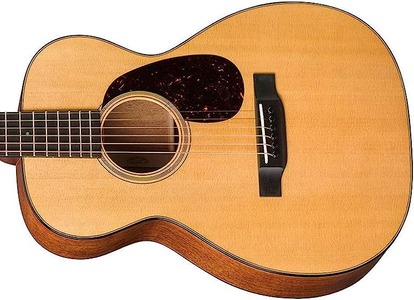
The Martin 0-18 is a timeless classic in the world of acoustic guitars, known for its smaller, parlor-like size that provides an intimate playing experience. Combining a solid Sitka spruce top with solid mahogany back and sides, it offers a rich, warm tone that’s perfectly suited for fingerpicking and solo performances.

The Martin 00-28 is a versatile, small-bodied acoustic guitar that beautifully marries traditional design with modern features. With its solid Sitka spruce top and solid East Indian rosewood back and sides, this guitar delivers a balanced, resonant tone that shines in both fingerstyle playing and strumming scenarios.
Taylor
Taylor Guitars has also made a mark in the parlor guitar realm with their high-quality offerings. Known for their attention to detail and innovative design features, Taylor delivers excellent playability and a balanced, articulate sound. Here a a couple of very popular models from Taylor in the Parlor category.
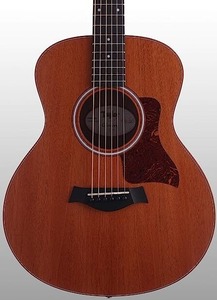
The Taylor GS Mini is a compact, scaled-down version of Taylor’s popular Grand Symphony body shape, designed to deliver robust, full-bodied tones in a portable package. With its high-quality construction and choice of solid top woods across different models, the GS Mini is renowned for providing a high-end playing experience that defies its small size.
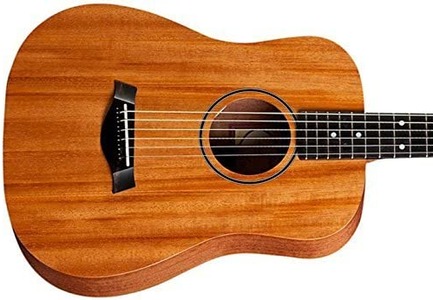
The Baby Taylor BT2 is a 3/4-size dreadnought that offers an impressive combination of portability, playability, and tonal quality. Built with a solid mahogany top and layered sapele back and sides, the BT2 delivers a rich, full sound that belies its smaller size, making it an ideal choice for travel, or younger players.
Fender
Fender parlor guitars offer the distinct combination of Fender’s musical heritage with the intimate, warm tones traditionally associated with parlor-sized guitars. These compact, stylish instruments are designed for comfort and portability, while providing the quality and sound that Fender is known for, making them ideal for both practice sessions and live performances.
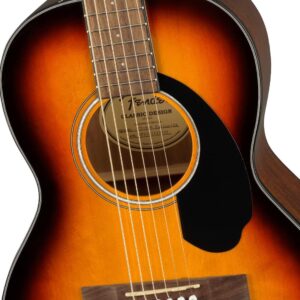
The Fender CP-60S is a parlor-sized acoustic guitar that combines Fender’s renowned craftsmanship with the intimate tone and playability of traditional parlor guitars. With its solid spruce top and mahogany back and sides, the CP-60S delivers a balanced, articulate tone, making it an excellent choice for both beginners and experienced players alike.
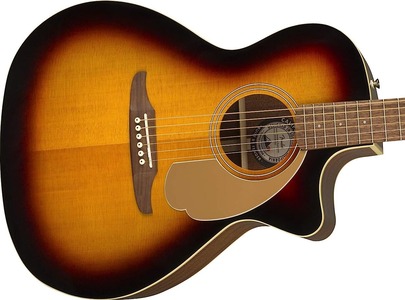
The Fender Newporter Player is part of Fender’s California Series, standing out with its unique body shape, vibrant color options, and the distinctive sound of a mid-sized acoustic guitar. Boasting a solid spruce top and mahogany back and sides, it offers rich, resonant tones and excellent playability.
The History of Parlor Guitars
Parlor guitars gained prominence in the late 1800s, as they provided an affordable and accessible option for individuals eager to embrace music. Their smaller size and lighter construction made them more portable than their larger counterparts, and they quickly found favor among traveling musicians, women, and those with limited living space. Their popularity grew even further with the rise of the blues, as many renowned blues players relied on these instruments to create their signature sounds.
Advantages of Parlor Guitars
Portability and Size
One of the most significant advantages is their portability. Their compact size makes them easy to carry around, whether you’re traveling, heading to a jam session, or simply enjoying a day at the beach. Their smaller dimensions also make them an excellent choice for younger players or individuals with smaller hands, as they offer a comfortable playing experience.
Comfortable Playability
Parlor guitars often feature a shorter scale length, resulting in reduced string tension. This lower tension makes it easier to fret chords and perform intricate fingerstyle patterns. Additionally, the smaller body size allows for a cozy playing position, reducing strain during long practice sessions or performances.
Unique Tonal Character
While parlor guitars may not produce the booming volume of larger instruments, they possess a unique tonal character that resonates with musicians seeking a distinct sound. Parlor guitars typically exhibit a rich midrange and a warm, intimate tone. This tonal quality lends itself well to genres such as blues, folk, and singer-songwriter music, where the focus is on storytelling and emotive expression.
Choosing the Right Parlor Guitar
When selecting a parlor guitar, several factors come into play to ensure you find the perfect match for your playing style and preferences.
Body Size and Shape
These guitars come in various shapes and sizes, each with its own sonic characteristics. The classic parlor shape features a small, compact body with a narrow waist and a round or oval soundhole. However, modern variations may include different body shapes such as grand concert or auditorium styles. Consider how the body size and shape influence the guitar’s projection, balance, and overall comfort while playing.
Tonewoods
The choice of tonewoods greatly impacts the sound of a parlor guitar. Spruce is a popular choice for the top, providing a balanced tone with clarity and responsiveness. Mahogany is commonly used for the back and sides, adding warmth and depth to the sound. Other tonewoods like cedar, rosewood, and maple offer their own unique tonal characteristics. Consider the tonewoods used in the construction of the guitar to ensure they align with your desired sound profile.
Build Quality
A well-crafted parlor guitar ensures optimal playability and sound quality. Look for solid construction, clean joinery, and attention to detail. The neck should be comfortable to grip, and the fretwork should be smooth and free of sharp edges. Check for any buzzing or unwanted vibrations that may indicate poor craftsmanship.
Budget Considerations
Set a realistic budget for your parlor guitar purchase. While there are options available at various price points, remember that higher-quality instruments often come with a higher price tag. Consider your needs as a player and strike a balance between your budget and the features you prioritize, such as tonal quality, playability, and build craftsmanship.
Parlor Guitars for Different Music Styles
Parlor guitars have found a place in various music genres, each showcasing their unique qualities. Let’s explore how parlor guitars suit different playing styles:
Blues
Parlor guitars have deep roots in the blues genre, and their intimate tone and responsive nature make them an excellent choice for blues players. The midrange focus and slightly compressed sound of parlor guitars contribute to the authentic bluesy character, allowing players to infuse soulful expression into their playing. Whether you’re exploring Delta blues or modern blues interpretations, a parlor guitar can deliver the raw, emotive sound that captures the essence of the genre.
Folk
Folk music often celebrates storytelling and simplicity, and parlor guitars align perfectly with these principles. Their intimate size and warm tonal characteristics complement the melodic and lyrical nature of folk music. From strumming chords to intricate fingerpicking patterns, parlor guitars offer a versatile and engaging companion for folk musicians.
Fingerstyle
Fingerstyle guitarists value the ability to bring out the nuances of each note, and parlor guitars excel in this aspect. The shorter scale length and reduced string tension make it easier to execute complex fingerstyle techniques and achieve intricate melodic lines. The balanced tonal response allows the player to emphasize the subtleties of their playing, making parlor guitars a favored choice for fingerstyle enthusiasts.
Singer-Songwriter
For singer-songwriters, a parlor guitar can be the ideal companion for crafting heartfelt compositions. The comfortable playability and intimate tone of parlor guitars support the vocals and provide a pleasing accompaniment to the lyrics. Whether you’re performing in an intimate setting or capturing recordings in a studio, a parlor guitar adds depth and character to your musical storytelling.
Maintenance of Parlor Guitars
To ensure your parlor guitar remains in optimal condition and continues to deliver its beautiful sound, proper maintenance is essential. Here are some care tips to keep in mind:
Proper Storage
When not in use, store your parlor guitar in a suitable case or gig bag to protect it from dust, humidity, and temperature fluctuations. Avoid exposing it to extreme heat or cold, as this can cause damage to the instrument.
Cleaning and Polishing
Regularly clean your parlor guitar to keep it looking and sounding its best. Use a soft, lint-free cloth to remove fingerprints, smudges, and dust from the body, neck, and fretboard. If necessary, you can use a guitar polish specifically designed for acoustic instruments to maintain the finish.
String Maintenance
Change your guitar strings regularly to maintain a fresh and vibrant tone. Wipe down the strings after each playing session to remove sweat and debris. Additionally, consider using a string conditioner or lubricant to prolong the life of your strings and enhance their playability.
Regular Maintenance Checks
Periodically inspect your parlor guitar for any signs of wear or potential issues. Check the action (string height) to ensure it’s comfortable for your playing style. Look for any loose or damaged hardware, such as tuners or bridge pins. If you notice any abnormalities or changes in the instrument’s performance, consult a professional luthier for assessment and adjustments.
Conclusion
Parlor guitars offer a delightful combination of vintage charm, compact size, and exceptional tonal character. Whether you’re drawn to their historical significance, portability, or unique tonal qualities, parlor guitars provide a captivating musical experience. By considering factors such as body size and shape, tonewoods, build quality, and budget, you can find the perfect parlor guitar to suit your playing style and preferences.
Popular brands like Martin, Taylor, Gibson, Washburn, and Recording King offer a range of high-quality parlor guitars to explore. These instruments find their place in various music styles, including blues, folk, fingerstyle, and singer-songwriter genres. Their intimate sound, comfortable playability, and versatility make them a favorite among musicians seeking to evoke emotion and captivate audiences.
Proper maintenance and care are essential to keep your parlor guitar in top condition. From proper storage and cleaning to regular maintenance checks and string care, these practices ensure your instrument stays in optimal shape for years to come.
Enhance your parlor guitar experience with accessories such as gig bags or cases, comfortable guitar straps, picks, capos, and acoustic preamps. These additions further enrich your playing and performance possibilities.
FAQs
Can parlor guitars be used for a professional performance?
Absolutely! Many professional musicians choose parlor guitars for their unique sound and intimate performance quality. With the right amplification and setup, parlor guitars can shine in various professional settings.
Are parlor guitars suitable for beginners?
Yes, parlor guitars can be an excellent choice for beginners. Their smaller size and comfortable playability make them ideal for learners, especially those with smaller hands. They also offer a unique tonal character that can inspire beginners to explore different music styles.
What is the price range for parlor guitars?
Parlor guitars are available in a wide price range. Entry-level models can start from around $200, while high-end, handcrafted options can cost several thousand dollars. Set a budget that aligns with your needs and expectations to find the right parlor guitar for you.
Can I play different music genres on a parlor guitar?
Yes, parlor guitars are versatile instruments that can adapt to various music genres. They excel in blues, folk, fingerstyle, and singer-songwriter styles, but you can explore and experiment with different genres to find your unique sound.
How often should I change the strings on my parlor guitar?
The frequency of string changes depends on several factors, including how often you play, your playing style, and the condition of the strings. As a general guideline, it’s recommended to change the strings every few months or whenever they start to sound dull or lose their intonation. Regularly wiping down the strings after playing can also extend their lifespan.





